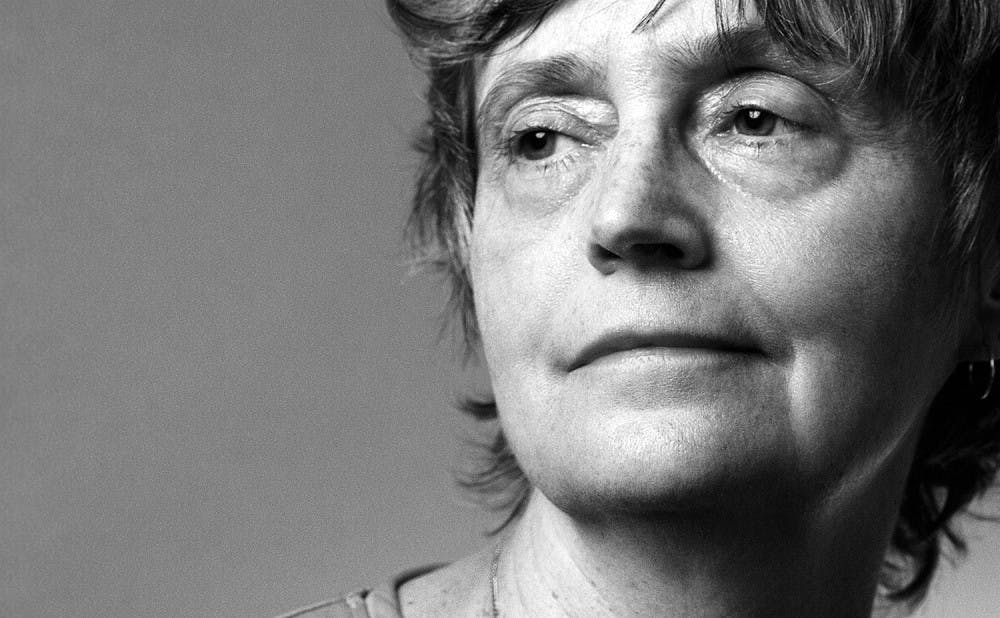“Art uses me for whatever it wants,” said Alice Notley, a woman on the front lines of poetry whose work has constantly challenged poetic conventions. An esteemed poet, Notley weaves critique, imagination and memory into one of the most dynamic collections of poetry for her generation.
This Monday, October 7 at 7 p.m., Notley will give a reading in McClendon Commons as part of an event sponsored by the Blackburn Fund and the Duke English Department.
Among other notable awards, Alice Notley has received the Los Angeles Times Book Award for Poetry and was a finalist for the Pulitzer Prize.
She has written over 25 books of poetry as well as an autobiography, a play and a series of essays. “Every book is incredible,” said Joseph Donahue, professor of the practice of English at Duke University. “It will be amazing to hear her voice work through these imagined territories.”
“She can do everything. Lots of poets can make a career doing just one of the things that she does,” continued Donahue. Notley's poems range from personal narratives to “hair-raising” epics to political inquiries that fiercely criticize the decisions of hegemonic structures within our global society.
“There is a fearlessness about her and a trust in her imagination,” said Donahue. These allow her to do “things that others will be afraid to do.”
Joel Brouwer, Professor of English at the University of Alabama, described Notley in an October 2007 New York Times review as a “poet who persistently exceeds, or eludes, the sum of her associations.” Although Notley is often described in terms of feminism, experimentalism and her family, she resists the need to use labels, which she deems restrictive.
Notley is often quoted for her statement, “It is necessary to maintain a state of disobedience against...everything.” With this mindset, she has been able to craft her work in a manner that severs ties with tradition. Notley has delved masterfully into the world of epics, a historically man-dominated area, as a means to unveil narrative. She has, however, sometimes had to face sexist pushback denouncing the legitimacy of her work. "I demand to be treated better and to be read better," said Notley.
In her essay, “The Poetics of Disobedience,” Notley rejects the labels that lump people together and have been placed upon her, refusing to let them become “not only an infringement on my liberty but a veil over clear thinking.” There is a freshness to her tone that invites the audience to become “disobedient” along with her, questioning the norms of the worlds in which people find themselves and pushing through any limitations placed upon creative expression. The spaces that fall between her words allow for reflection upon the resonance of sound, and the stream-of-consciousness style of many of her pieces develops ideas in a manner not far removed from the natural processing of the mind.
Notley has lived in many different places throughout her life, and the spaces themselves speak through her poetry. She was born in Bisbee, Arizona but grew up in Needles, California and, after moving around for a few years, settled in New York, informing her style as a second-generation New York School poet. She currently resides in Paris, her home of 21 years.
When asked about the ways in which her writing has been influenced by the physical spaces of her lifetime, Alice replied, “When I write thinking about Needles, my work becomes more hard-edged, as if it’s in a desert light—I’m talking about the words themselves here, not necessarily about what my so-called subject might be. When I write out of a feeling for New York or Paris, the language becomes denser or more conversational. One’s writing grows to resemble the place where one lives, though this is usually pretty subjective in poetry.”
Notley, as described by Donahue, is "incredibly prolific," "fearless," and "always a surprise." He continued, "It is a reading of a lifetime...to hear a poet of this scale scope read. She's one of the great ones."
Notley will read both published and new work on Mon., October 7 at 7 p.m. in McClendon Commons. Admission is free. For more information, visit http://english.duke.edu/.
Get The Chronicle straight to your inbox
Signup for our weekly newsletter. Cancel at any time.

